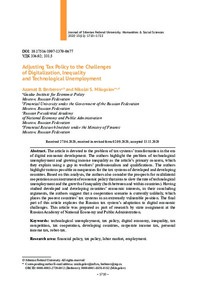Adjusting Tax Policy to the Challenges of Digitalization, Inequality and Technological Unemployment
Скачать файл:
URI (для ссылок/цитирований):
https://elib.sfu-kras.ru/handle/2311/137742Автор:
Berberov, Azamat B.
Milogolov, Nikolai S.
Берберов, А.Б.
Милоголов, Н.С.
Дата:
2020-11Журнал:
Журнал Сибирского федерального университета. Гуманитарные науки. Journal of Siberian Federal University. Humanities & Social Sciences;2020 13 (11)Аннотация:
The article is devoted to the problem of tax systems’ transformation in the era of digital economic development. The authors highlight the problem of technological unemployment and growing income inequality as the article’s primary concern, which they explain using a gap in workers’ professionalism and qualifications. The authors highlight various possible consequences for the tax systems of developed and developing countries. Based on this analysis, the authors also consider the prospects for multilateral cooperation as an instrument of economic policy that aims to slow the rate of technological unemployment and the growth of inequality (both between and within countries). Having studied developed and developing countries’ economic interests, in their concluding arguments, the authors suggest that a cooperation scenario is currently unlikely, which places the poorest countries’ tax systems in an extremely vulnerable position. The final part of this article explores the Russian tax system’s adaptation to digital economic challenges. This article was prepared as part of research by state assignment at the Russian Academy of National Economy and Public Administration Статья посвящена проблеме трансформации налоговых систем в эпоху цифрового развития экономики. В качестве основной проблемы авторы выделяют проблему технологической безработицы и растущего неравенства доходов,
объясняемого разрывом в профессионально-квалификационном
уровне работников. Авторы выделяют различные возможные последствия для налоговых систем
развитых и развивающихся государств. Исходя из этого авторы также рассматривают перспективы многостороннего сотрудничества как инструмента экономической
политики, направленного на замедление темпов технологической безработицы
и роста неравенства (как между странами, так и внутри них). Изучив экономические интересы развитых и развивающихся государств при заключении соглашений, авторы предполагают, что такой сценарий сотрудничества в настоящее время
вряд ли является реальным, он поставит налоговые системы беднейших государств
в крайне уязвимое положение. Заключительная часть статьи посвящена вопросам
адаптации российской налоговой системы к вызовам цифровой экономики
Коллекции:
Метаданные:
Показать полную информациюСвязанные материалы
Показаны похожие ресурсы по названию, автору или тематике.
-
Windfall Profits of Russian Companies: Taxation vs Voluntary Contribution to the Budget
Polezharova, Lyudmila V.; Gusev, Dmitry S.; Полежарова, Л. В.; Гусев, Д. С. (Journal of Siberian Federal University. Сибирский федеральный университет, 2024-03)The subject is the economic relations that arise between the state and mining companies regarding the redistribution of excess (windfall) profits – the financial result obtained as a result of changes in quotations in ... -
Internationalization of Tax Administration in the Digital Age: Case Study of the Federal Tax Service of Russia
Milogolov, Nikolai S.; Polezharova, Lyudmila V.; Machekhin, Viktor A.; Милоголов, Н. С.; Полежарова, Л. В.; Мачехин, В. А. (Сибирский федеральный университет. Siberian Federal University, 2023-03)The article is devoted to the study of challenges which tax administration of Russia is facing in the current era of global cooperation and digitalization and its approach to perform its functions effectively in international ... -
Russia in Global Digital Tax Reform: Together or Apart?
Milogolov, Nikolai S.; Berberov, Azamat B.; Милоголов, Н. С.; Берберов, А. Б. (Сибирский федеральный университет. Siberian Federal University, 2021-11)The goal of this research is to develop policy proposals for a reform of Russian corporate income tax legislation. The paper reviews and analyses international and Russian tax policy context and ongoing reforms that aim ... -
Налоги и налоговое планирование (продвинутый курс)
Сибирский федеральный университет; Торгово-экономический институт; Конева, Ольга Васильевна; Пинская, М. Р. (СФУ, Красноярск, 2013)Учебно-методический комплекс дисциплины предназначен для бакалавров по направлению подготовки 080100.68 «Экономика», по магистерской программе 080100.68.12 «Бухгалтерский учет и финансовый менеджмент». -
Дробление бизнеса и статья 54.1 Налогового кодекса Российской Федерации
Ефремова, Е. С.; Efremova, Ekaterina S. (Journal of Siberian Federal University. Сибирский федеральный университет, 2024-06)Налоговая оптимизация – это правомерная деятельность налогоплательщика, направленная на получение налоговой выгоды в виде уменьшения размера налоговых обязательств. Конституционный Суд РФ неоднократно указывал на то, ...

